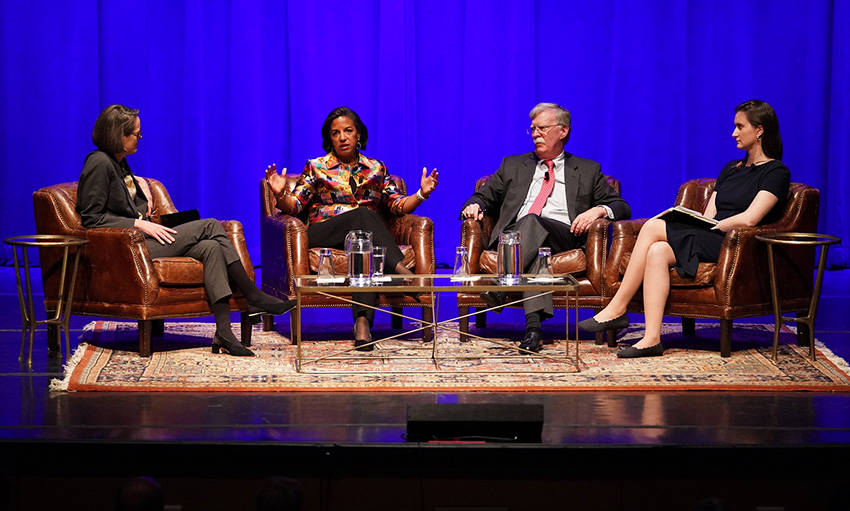Susan Rice and John Bolton agreed during the Vanderbilt Chancellor’s Lecture on “Defining U.S. Global Leadership” that significant improvements are needed in the current decision-making process on national security issues, but the two sharply differed in their opinions on the recent presidential impeachment process.
Interim Chancellor and Provost Susan R. Wente hosted the Feb. 19 event at Langford Auditorium, noting in her introductory remarks the speakers’ connection to the spring series theme, “Our Global Community.”
“We are examining the challenges, advantages and responsibilities that come with living in today’s increasingly interconnected and complex world,” Wente said. “Susan Rice and John Bolton, as notable experts in foreign policy, have driven conversations on national and international levels. They have encouraged active discourse among people around the world and certainly here at Vanderbilt.”
Rice began the discussion with an overview of the responsibilities of the national security advisor. She relayed that one of the duties is serving as principal adviser to the president on national security issues, providing the best advice as to what are the choices and decisions the president ought to make.
Bolton agreed with Rice’s description but said there are other realities to the job. “The issue for any national security adviser is to try to get a feel for what the president does in terms of their decision-making process,” said Bolton, who has worked for four Republican presidents, including Donald Trump. “Each president has a different style throughout the history of the National Security Council from when it was first formed. The real question is whether they use it effectively or not.” He acknowledged that he called many of his predecessors, including Rice, for advice before accepting the position in the Trump administration in 2018.
Rice, who is the author of the recent New York Times bestseller Tough Love: My Story of the Things Worth Fighting For, responded that one cannot overestimate the importance of a functioning, responsible national security decision-making process. “Of course, you can have the great decision-making process, but if the president of the United States is going to keep only his counsel, disregard the wisdom of those he selects as his advisers, and tweets at 1:30 a.m. whatever comes to mind, it’s really hard to do one’s job. Whatever policy disagreements John and I have, I have enormous sympathy and appreciation for the challenges of somebody playing the role of national security advisor in this particular context.”

The sharpest disagreement between the two speakers and loudest response from the audience came during discussion of the impeachment hearings against President Trump. Rice said Trump was guilty of using the powers of his office for personal political gain.
“The president of the United States withheld congressionally appropriated military assistance badly needed by a friendly government that was facing hostile invasion by our principal adversary, Russia,” she said. “And he withheld a White House meeting in order to extort bogus political dirt on his principal domestic opponent.”
Rice said that she could not fathom declining to speak out if she knew of such behavior by a president, with or without a subpoena. “I can’t imagine, even in the absence of being able to provide that information directly to Congress, not exercising the First Amendment. I would feel like I was violating my oath to support and defend the Constitution.”
Bolton described the process in the House of Representatives as overly partisan and “impeachment malpractice.” He said it would not have made any difference in the outcome whether or not he had testified before the U.S. Senate. In addition, he said he is following the advice of his attorney in not speaking out on specifics of what he would have said in potential testimony while his upcoming book, The Room Where It Happened: A White House Memoir, is in the pre-clearance process with the White House.
During the event, which filled Langford Auditorium and spilled out to an overflow room, Bolton and Rice responded to questions from Ingrid Wuerth, the Helen Strong Curry Chair in International Law and director of the Cecil D. Branstetter Litigation and Dispute Resolution Program, and Hannah Martins Miller, a third-year law student and active-duty captain in the U.S. Army.
The conversation concluded with the two speakers being asked what they see as the most significant potential threats to the United States in the years ahead.
Bolton responded that the U.S. response to China, on issues that include aggressive cyber-war capabilities and aspirations for extending its power globally, has been inadequate for too long. Rice said she agreed with Bolton with a view toward the next decade, but the more immediate concern is Russia. “In addition to Russia and China, we still face a wide range of what I call transnational security threats, and the terrorist threat is not gone.” Rice also mentioned climate change and the threat of pandemics.
During the two speakers’ visit to campus, Bolton spoke to a class taught by Thomas Alan Schwartz, distinguished professor of history and professor of political science. Meanwhile, Rice met with a gathering of students at E. Bronson Ingram College.
The next signature speaker for the Chancellor’s Lecture Series this spring will be Anderson Cooper, journalist, CNN anchor and author, on March 15 at Langford Auditorium. Free tickets will be required for entry to the event and will be made available in early March.
For more information, email cls@vanderbilt.edu.